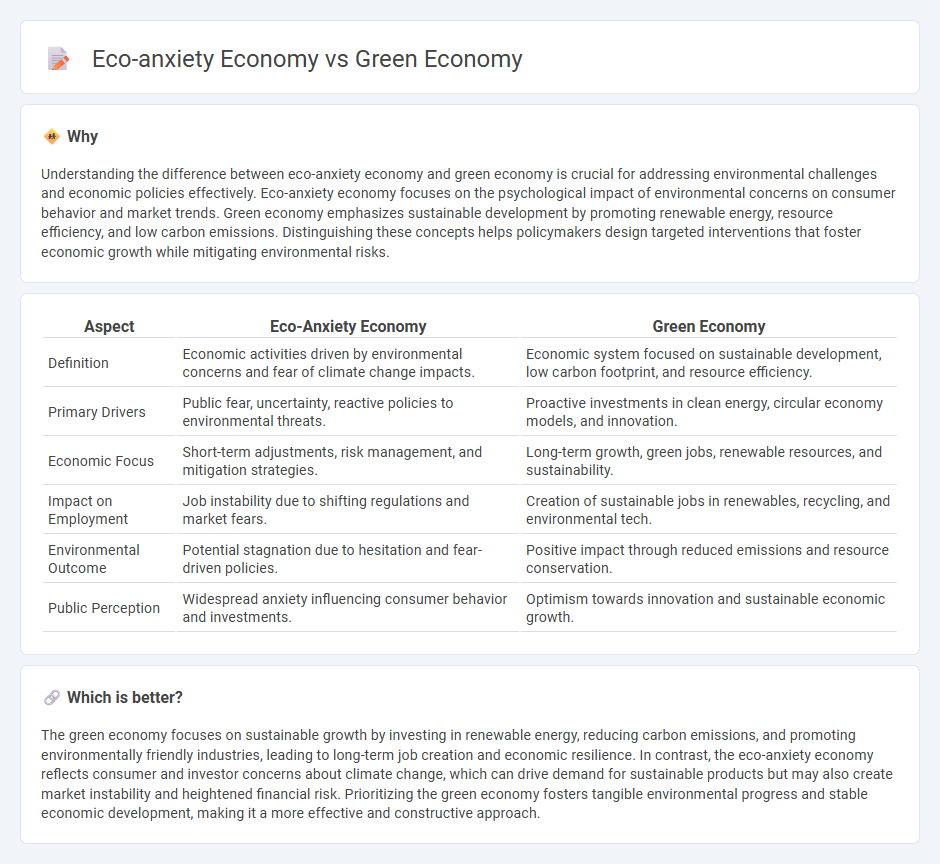
Eco-anxiety reflects growing public concern over climate change's impact on economic stability and personal well-being, highlighting tensions between current economic practices and sustainable growth. The green economy focuses on reducing environmental risks and ecological scarcities by promoting renewable energy, green jobs, and sustainable resource management. Explore how transitioning to a green economy can alleviate eco-anxiety and foster long-term economic resilience.
Why it is important
Understanding the difference between eco-anxiety economy and green economy is crucial for addressing environmental challenges and economic policies effectively. Eco-anxiety economy focuses on the psychological impact of environmental concerns on consumer behavior and market trends. Green economy emphasizes sustainable development by promoting renewable energy, resource efficiency, and low carbon emissions. Distinguishing these concepts helps policymakers design targeted interventions that foster economic growth while mitigating environmental risks.
Comparison Table
| Aspect | Eco-Anxiety Economy | Green Economy |
|---|---|---|
| Definition | Economic activities driven by environmental concerns and fear of climate change impacts. | Economic system focused on sustainable development, low carbon footprint, and resource efficiency. |
| Primary Drivers | Public fear, uncertainty, reactive policies to environmental threats. | Proactive investments in clean energy, circular economy models, and innovation. |
| Economic Focus | Short-term adjustments, risk management, and mitigation strategies. | Long-term growth, green jobs, renewable resources, and sustainability. |
| Impact on Employment | Job instability due to shifting regulations and market fears. | Creation of sustainable jobs in renewables, recycling, and environmental tech. |
| Environmental Outcome | Potential stagnation due to hesitation and fear-driven policies. | Positive impact through reduced emissions and resource conservation. |
| Public Perception | Widespread anxiety influencing consumer behavior and investments. | Optimism towards innovation and sustainable economic growth. |
Which is better?
The green economy focuses on sustainable growth by investing in renewable energy, reducing carbon emissions, and promoting environmentally friendly industries, leading to long-term job creation and economic resilience. In contrast, the eco-anxiety economy reflects consumer and investor concerns about climate change, which can drive demand for sustainable products but may also create market instability and heightened financial risk. Prioritizing the green economy fosters tangible environmental progress and stable economic development, making it a more effective and constructive approach.
Connection
Eco-anxiety drives consumer demand for sustainable products, influencing the growth of the green economy by prioritizing eco-friendly industries and renewable energy investments. This psychological response to environmental concerns accelerates shifts in market behavior and policy-making toward reducing carbon footprints and supporting circular economy models. Consequently, the rise of eco-anxiety catalyzes economic transformations focused on climate resilience, resource efficiency, and sustainable development goals.
Key Terms
Sustainable Development
The green economy emphasizes sustainable development through investment in renewable energy, resource efficiency, and low-carbon technologies to promote environmental health and economic growth. Eco-anxiety economy reflects the psychological and behavioral impact of environmental crises, influencing consumer choices and policy demands toward sustainability. Explore deeper insights on how these concepts shape our future sustainable development strategies.
Carbon Pricing
The green economy emphasizes sustainable growth by integrating carbon pricing mechanisms that incentivize reducing greenhouse gas emissions and promoting clean energy investments. In contrast, the eco-anxiety economy reflects the societal stress and behavioral shifts driven by environmental concerns and climate urgency, impacting consumer choices and policy demands. Explore how carbon pricing strategies can balance economic development with mental health resilience in the face of ecological challenges.
Climate-Induced Financial Risk
The green economy prioritizes sustainable investments and renewable energy solutions to mitigate climate-induced financial risks, aiming to stabilize markets and promote long-term economic resilience. In contrast, the eco-anxiety economy reflects growing consumer and investor concerns about environmental crises, which can drive volatile asset flows and cautious financial behaviors. Explore the dynamics between these economic models to better understand their impacts on climate risk management and financial stability.
Source and External Links
Green economy: definition, meaning and principles | Enel X - A green economy is an economic model prioritizing human well-being and social equity while reducing environmental risks by supporting sustainable development through public and private investments that foster social and environmental sustainability and low-carbon infrastructure.
Green economy - Wikipedia - The green economy aims to reduce environmental risks and ecological scarcities, pursuing sustainable development without environmental degradation and promoting green growth aligned with economic growth decoupled from resource depletion and pollution.
3. Green economy - European Environment Agency - The green economy improves human well-being and social equity while significantly lowering environmental risks and scarcities, integrating economic and environmental policies to enable new economic growth sources without overexploiting natural assets.
 dowidth.com
dowidth.com